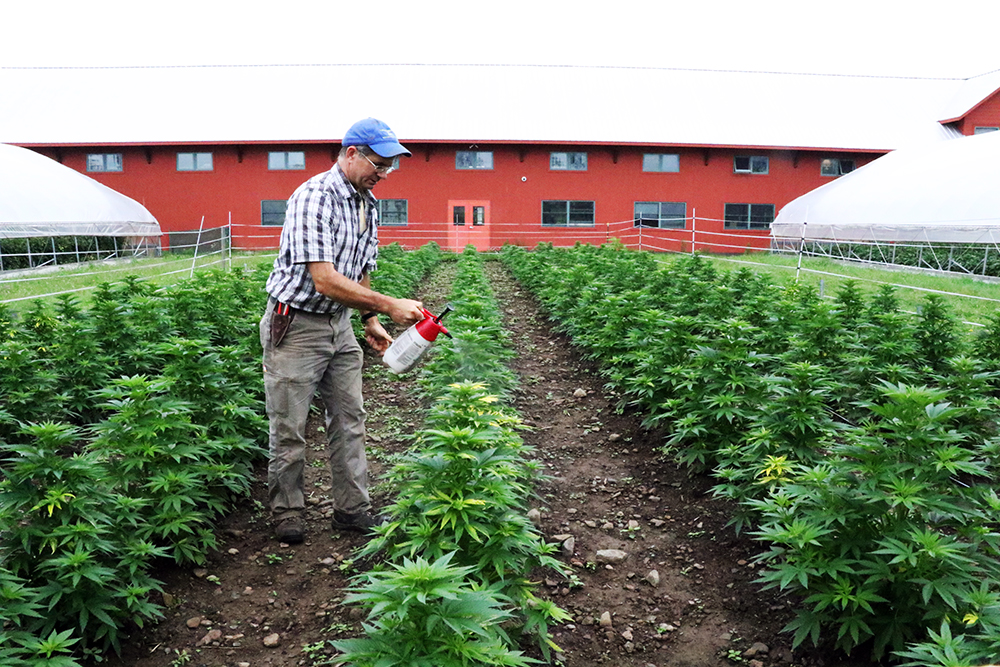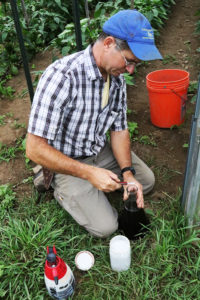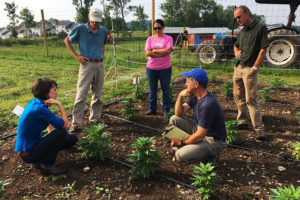By Amanda Loviza
HURLEYVILLE – The Center for Discovery, in partnership with SUNY Sullivan, is four months into an agricultural research license granted by the State of New York to study industrial hemp at its Hurleyville farm.

The project between The Center and SUNY Sullivan stands out among the 10 hemp licenses granted thus far in New York, for two reasons. The Center’s interest in the future of the hemp industry is centered around a compound found in hemp plants called cannabidiol, or CBD. Recent research, including a study published in the New England Journal of Medicine, shows evidence that CBD could be used to treat seizures and other medical conditions that affect many of The Center’s residents and students. The Center wants to help create a path forward in researching CBD’s effectiveness as a medical treatment. As for its growing practices, The Center has a certified organic and biodynamic farm, and it is currently the only New York hemp grower studying how biodynamic growing practices can potentially affect the quality of a hemp plant’s CBD content. TCFD is partnering with SUNY Sullivan to conduct the agricultural research, with seeds donated by Colorado-based company CW Hemp.

TCFD Director of Farm Services Greg York was out in the hemp fields recently, spraying a carefully cultivated natural concoction on the plants, on a carefully chosen day of the lunar cycle. The philosophy behind farming biodynamically, Mr. York explained, is to take into account more than just the single field—biodynamic farmers consider the land of the entire region, the planet and even the position of the stars.
“The idea is that you’re basically trying to farm and grow food in concert with nature,” Mr. York said.
Mr. York’s aromatic spray combined fruit embryos, barley and powdered gemstones to create a treatment that will work with the plant’s natural biology to encourage certain growth patterns. The Center works with California-based plant alchemist Dennis Klocek, who specializes in growing medicinal plants. The spray is applied according to the lunar cycle, in coordination with the plant’s natural cycle. No detail is overlooked. Growing biodynamically is about pulling back and seeing the whole picture, Mr. York said, at every level of nature and the universe.
“There’s a little bit of ‘woo’ in there, but most of it is biology,” said Mr. York, who has a master’s degree in agronomy and 20 years’ experience growing food.
A biodynamic farmer is a steward of the landscape, Mr. York said. The Center’s highly educated farm team includes several master’s degrees and degrees from Yale, and they take their research seriously. If the hemp research project shows that these biodynamic practices and sprays can promote more potent oil production from the hemp plants, that information can be used in growing culinary herbs and other foods. If farmers can grow food that is more aromatic and has a more intense flavor using methods that are good for the earth, it will benefit everyone, Mr. York said.
“It’s not just about hemp for us,” Mr. York said.

The hemp plants were about six weeks old at the end of July, and by the end of August the Center farmers should be able to tell whether their practices are having a beneficial impact on the plants. Harvest time will come in September. Groups of the plants have been grown using slightly different organic and biodynamic practices, and they will be tested to see if the growing methods made a difference in CBD production.
As laws and policies regarding hemp oil as a medical treatment and its ability to be administered in New York state-funded healthcare facilities develop, the research conducted by The Center for Discovery and SUNY Sullivan will continue to build the body of knowledge regarding CBD and its potential uses. Hemp oil will not be approved for administration to TCFD residents in the immediate future.
